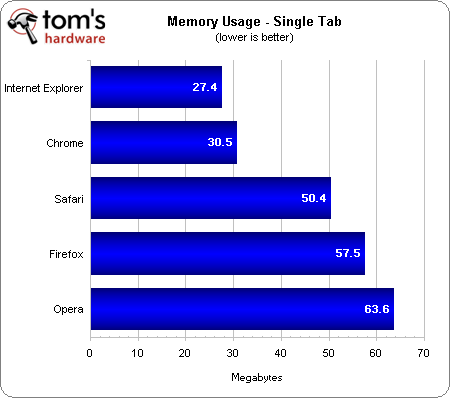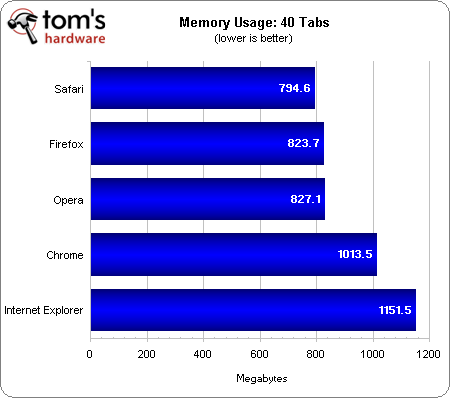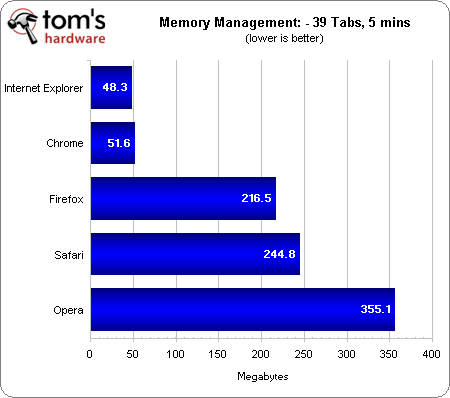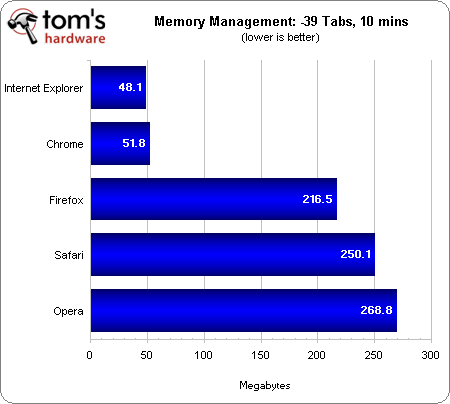Web Browser Grand Prix 5: Opera 11.50, Firefox 5, And Chrome 12
Three major released have landed since our last impromptu Web Browser Grand Prix (WBGP4): Chrome 12, Firefox 5, and Opera 11.50. Can Chrome or Opera regain the WBGP championship? Will Mozilla Firefox ever overtake Microsoft's IE9 in the rankings?
Efficiency Benchmarks: Memory Usage And Management
Memory Usage: Single Tab
There are measurable differences in total memory usage between the contenders in this benchmark. First place clearly goes to Internet Explorer 9, which uses only 27 MB to display a single tab. Close to the IE9 score is Google Chrome, needing 30 MB. Safari is in third place, using 50 MB. Mozilla's latest browser follows up in fourth place at 57.5 MB, while Opera still uses the most memory, totaling 63.6 MB.
Memory Usage: 40 Tabs
As usual, each tab had to be loaded individually in Safari, otherwise Apple's Web browser would find itself in an infinite loop of loading.
Uncooperative Apple Safari comes in with the lowest memory usage when all 40 tabs are open, beating Mozilla Firefox by 25 MB. In third place, Opera is the last browser to use less than 1 GB to display 40 tabs (a measurable advantage over previous versions of the Norwegian browser, this time only 5 MB behind Firefox). Chrome is in fourth place at around 1 GB, while last-place finisher IE9 uses 150 MB more than the 1 GB barrier.
Memory Management: -39 Tabs (5 minutes)
After closing 39 of the 40 tabs and waiting five minutes, the memory usage of IE9 and Chrome drop near their single-tab totals to take first and second place, respectively. In third place, Firefox 5 drops down to around 200 MB, still four times its single-tab usage. Fourth place Safari still hangs onto 250 MB after closing 39 tabs, which is about five times this browser's single-tab total. Opera again comes in last, keeping more than 350 MB, less than half of its 40-tab memory usage.
Get Tom's Hardware's best news and in-depth reviews, straight to your inbox.
Memory Management: -39 Tabs (10 minutes)
After waiting five more minutes, the order and totals remain the same, except for Opera which drops another 70 megabytes. While this is not enough to move Opera out of last place, it is a significant improvement in memory management over previous versions.
Current page: Efficiency Benchmarks: Memory Usage And Management
Prev Page Performance Benchmarks: HTML5 Hardware Acceleration And WebGL Next Page Efficiency Benchmarks: Battery Life-
somehow it seems that firefox is focussing more on benchmarks rather than actual real world usage.Reply
-
Tamz_msc First of all, this is the most thorough WBGP yet.Reply
somehow it seems that firefox is focussing more on benchmarks rather than actual real world usage.
I don't think so - proper page loads and battery life are important considerations.
I agree that Mozilla did not do a right thing in copying Chrome's release cycle, but at least they're trying - for example, they're trying hard in bringing down memory usage by increasing the garbage collection frequency(check this out in the Aurora and Nightly builds).
WBGP is basically a test of speed, and Chrome may have won in that, but Firefox is not far behind. I can wait for two or three seconds for my page to load. You can easily bring down the page load times by using addons like AdBlock Plus.
Even with the faster release cycle, this article clearly states that Firefox is still the most stable browser. Many people say that they've had numerous crashes, but its something wrong with their drivers or OS - I have not had a single crash since FF 4.0 beta 5 (or 7?), when they introduced hardware acceleration for the first time.
Firefox remains the most customizable browser, while Opera has the most number of features out-of-the-box.
So overall, according to me Firefox>=Opera>Chrome>IE 9> Safari. -
cadder Will you guys please investigate the SECURITY of each browser? I would use the one that is most secure even if it is slowest.Reply -
Tamz_msc Reply
That's easy: FF+AdBlock Plus+ NoScript+Ghostery+BrowserProtect9516697 said:Will you guys please investigate the SECURITY of each browser? I would use the one that is most secure even if it is slowest. -
ChiefTexas_82 IE 9 is a speed demon? I droped IE because it started running like ****. I blame loading too many side programs after years on the web. So I wanted to try Chrome or Firefox. Being a Google fan already, I tried Chrome. So far it leaves my old IE8 in the dust. Except for a certain bug, I would say it has been an improvement in almost every way.Reply -
thartist Damn, Opera has it's flaws but it's nonetheless the one that does one thing best: browsing.Reply



